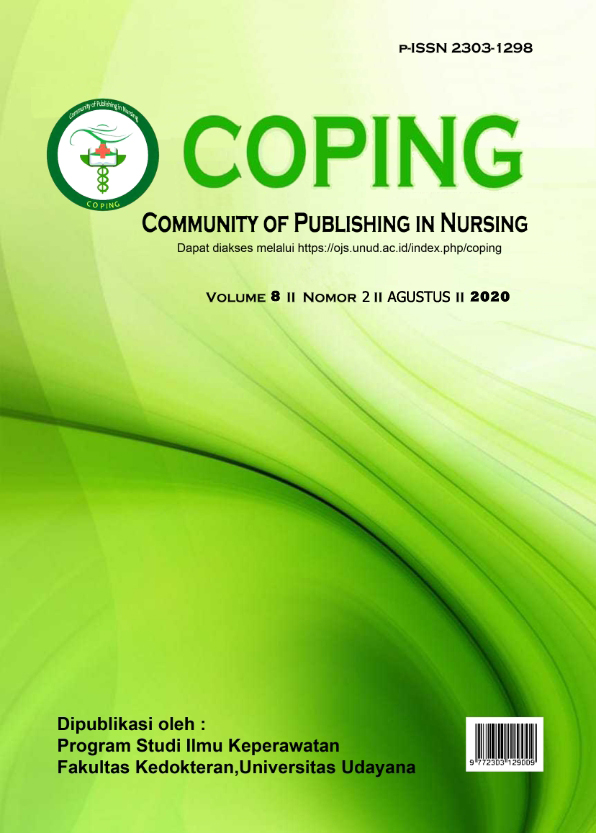HEALTH LOCUS OF CONTROL PASIEN GAGAL GINJAL TERMINAL YANG MENJALANI HEMODIALISIS
Abstract
Patient with kidney failure who are undergoing hemodialysis routine needs to carry out various disease management including long-term hemodialysis. Beliefs are known to control patient health. Health locus of control becomes a concept regarding the patient’s belief and has control in their health status. This study aimed to identify a health locus of control in a hemodialysis patient. This study used a cross-sectional design. One hundred hemodialysis patients completed the multidimensional health locus of control scale. Data were collected in the Hemodialysis Room at RSD Mangusada and RSUD Wangaya during July-August 2019. The results showed that the mean internal health locus of control was higher than chance and powerful others, namely 29.35; 22.45; and 27.95. The respondents in this study indicate that they believed themselves exerted more control over their health than other people, doctors, and chance. These results serve as important information regarding the health control beliefs of hemodialysis patients.
Downloads
References
Antari, G. A. A., Sukmarini, L., & Adam, M. (2019). Associated factors of post-hemodialysis recovery time in kidney failure patients. Enfermeria Clinica, 29, 247–251. https://doi.org/10.1016/j.enfcli.2019.04.139
Bikbov, B., Purcell, C. A., Levey, A. S., Smith, M., Abdoli, A., Abebe, M., … Chronic Kidney Disease Collaboration, G. (2020). Global, regional, and national burden of chronic kidney disease, 1990–2017: a systematic analysis for the Global Burden of Disease Study 2017. The Lancet, 395, 709–733. https://doi.org/10.1016/S0140-6736(20)30045-3
Fan, J. L., Kong, Y., Shi, S. H., & Cheng, Y. H. (2016). Positive correlations between the health locus of control and self-management behaviors in hemodialysis patients in Xiamen. International Journal of Nursing Sciences, 3(1), 96–101. https://doi.org/10.1016/j.ijnss.2016.02.002
Griva, K., Jayasena, D., Davenport, A., Harrison, M., & Newman, S. P. (2009). Illness and treatment cognitions and health related quality of life in end stage renal disease. British Journal of Health Psychology, 14(1), 17–34. https://doi.org/10.1348/135910708X292355
Mahmoud, S., & Abdelaziz, N. A. (2015). Association between Health Locus of Control, Self-care and Self-efficacy in Patients with End Stage Renal Disease Undergoing Hemodialysis. In Life Science Journal (Vol. 12). Retrieved from http://www.lifesciencesite.com58
Murali Id, K. M., Mullan, J., Roodenrys, S., Hassan, H. C., Lambert Id, K., & Lonergan Id, M. (2019). Strategies to improve dietary, fluid, dialysis or medication adherence in patients with end stage kidney disease on dialysis: A systematic review and meta-analysis of randomized intervention trials. https://doi.org/10.1371/journal.pone.0211479
National Kidney Foundation. (2015). Global Facts: About Kidney Disease . Retrieved August 8, 2020, from https://www.kidney.org/kidneydisease/global-facts-about-kidney-disease
Theofilou, P. (2012). Quality of life and mental health in hemodialysis and peritoneal dialysis patients: The role of health beliefs. International Urology and Nephrology, 44(1), 245–253. https://doi.org/10.1007/s11255-011-9975-0
US Renal Data System. (2019). Annual data report: Epidemiology of kidney disease in the United States executive summary.
Wallston ; Stein ; Smith. (1994). Form C of the MHLC Scales: A condition-specific measure of locus of control,. Journal of Personality Assessment, 63(3), 534–553. https://doi.org/https://doi.org/10.1207/s15327752jpa6303_10
Wallston, K. A., Ph, D., Wallston, B. S., Ph, D., Devellis, R., & Ph, D. (1978). Development of the Multidimensional Health Locus of Control (MHLC) scales. Health Education Monographs Spring, 6(2), 160–170.







